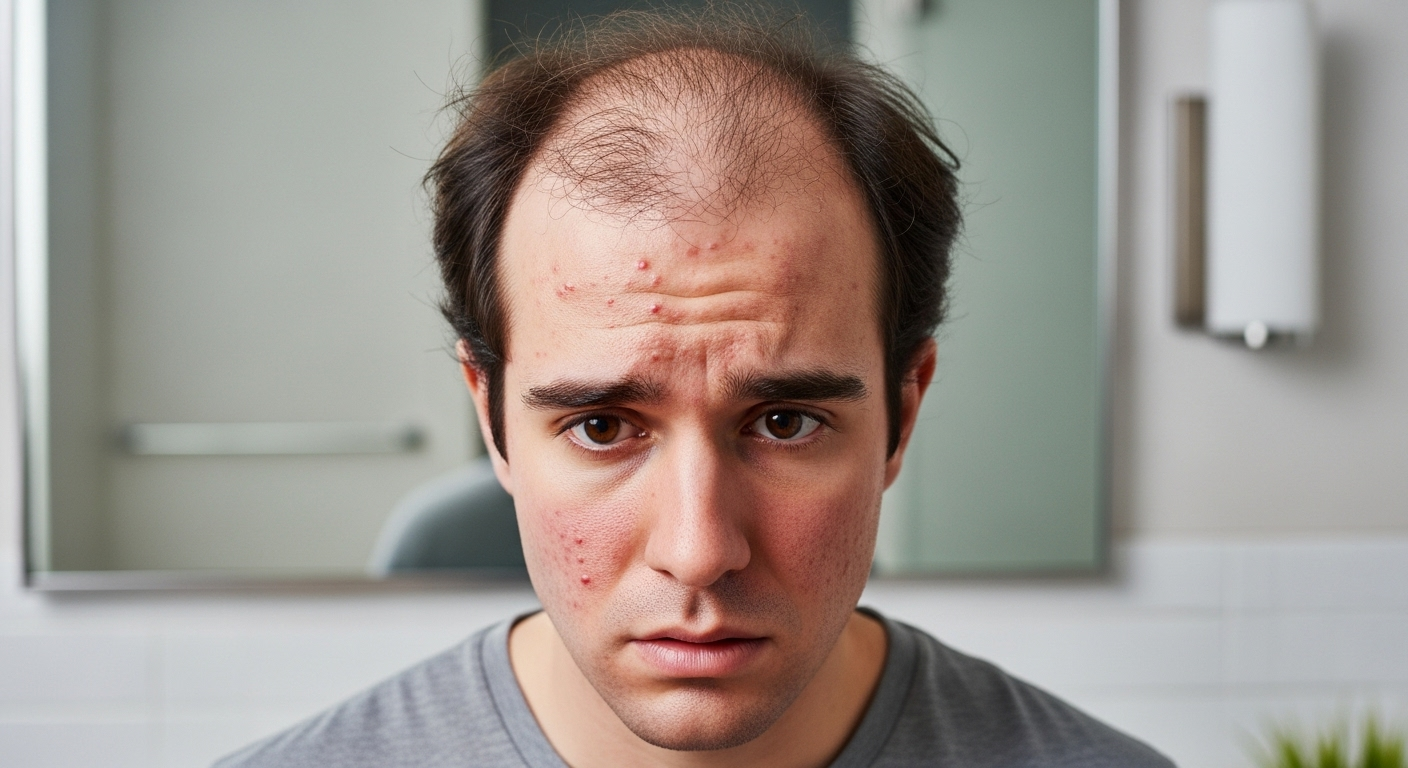Hair loss can be an unexpected and concerning side effect for those who use anabolic steroids like Trenbolone. If you’ve noticed your hair thinning or shedding while on Tren, you're not alone. Tren hair loss is a common problem faced by many individuals who use this potent steroid for muscle gain. In this article, we’ll …
Hair loss can be an unexpected and concerning side effect for those who use anabolic steroids like Trenbolone. If you’ve noticed your hair thinning or shedding while on Tren, you’re not alone. Tren hair loss is a common problem faced by many individuals who use this potent steroid for muscle gain.
In this article, we’ll explore the causes of Trenbolone-related hair loss, how it affects your hair, and the steps you can take to manage or even reverse the damage. You’ll also discover expert-backed solutions to help maintain your hair health while using Tren.
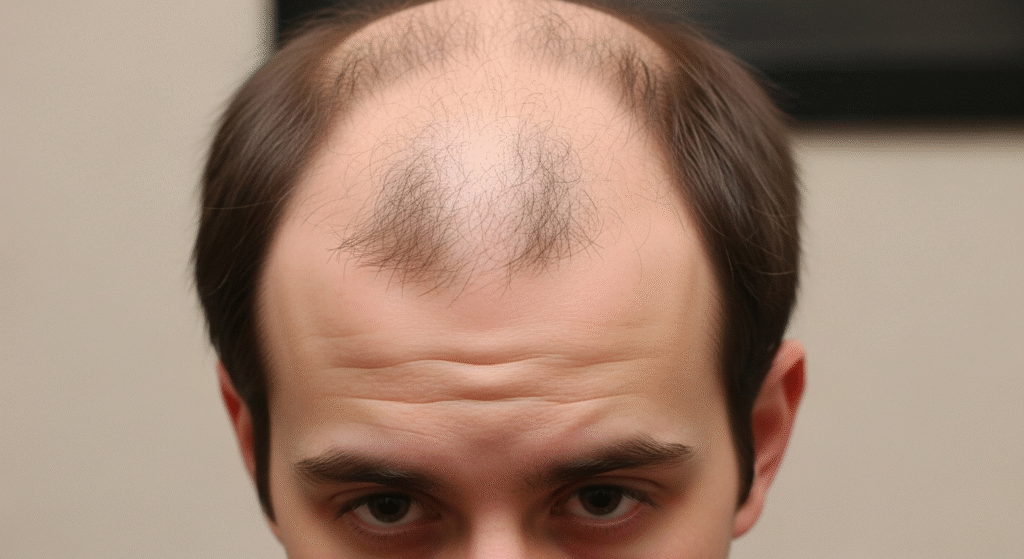
What Is Trenbolone and How Does It Cause Hair Loss?
Trenbolone, often referred to simply as Tren, is a powerful anabolic steroid used primarily by bodybuilders and athletes to increase muscle mass, strength, and fat loss. Trenbolone is known for its high potency and effectiveness, but it comes with a number of side effects, one of the most common being hair loss.
Overview of Trenbolone
Trenbolone is derived from nandrolone, and it’s one of the most potent steroids available. It’s known for its ability to promote rapid muscle growth, enhance fat loss, and increase endurance. However, with these benefits comes a significant risk of side effects, particularly when it comes to hair loss.
Why Does Trenbolone Lead to Hair Loss?
The primary reason Trenbolone causes hair loss is its ability to increase the production of dihydrotestosterone (DHT), a potent androgenic hormone. DHT is derived from testosterone, and it plays a major role in the development of male characteristics, including facial hair.
However, high levels of DHT can shrink hair follicles, leading to androgenic alopecia—the medical term for male-pattern baldness. This is why many users of Trenbolone experience significant hair thinning or shedding during their cycle.
Understanding the Science Behind Tren Hair Loss
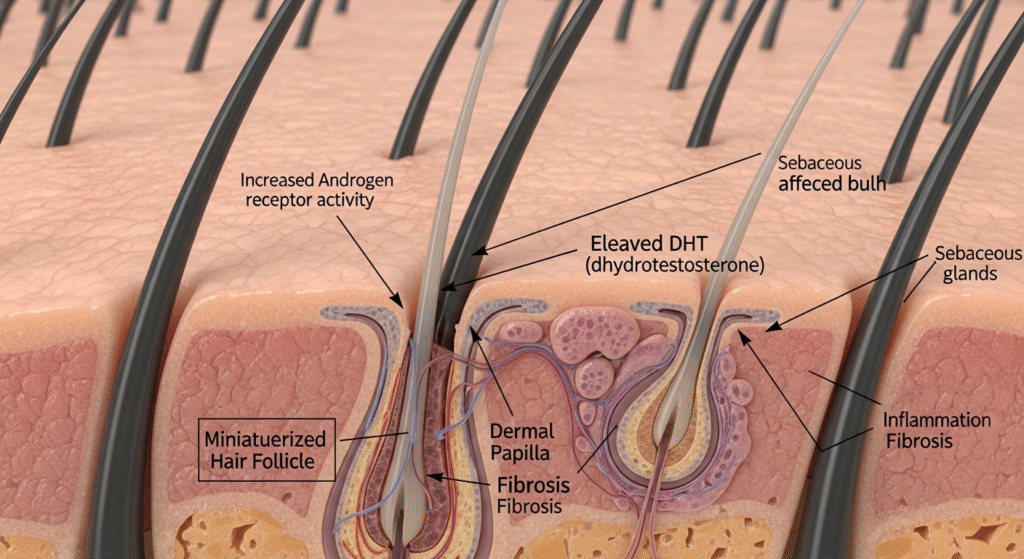
To understand how Trenbolone affects hair growth, it’s essential to know how DHT works in the body and its impact on hair follicles.
Trenbolone and Its Impact on Hormones
Trenbolone increases both testosterone and DHT levels in the body. While testosterone can support muscle growth, DHT has an androgenic effect on the body, especially when it binds to androgen receptors on the hair follicles. The higher the DHT levels, the more likely it is that hair follicles will shrink, eventually leading to thinning hair or complete hair loss.
DHT: The Key Culprit in Tren Hair Loss
DHT is responsible for the miniaturization of hair follicles. When hair follicles shrink, they produce thinner and weaker strands of hair, which are more prone to falling out. Individuals with a genetic predisposition to hair loss are even more susceptible to Trenbolone’s effects, as their hair follicles are more sensitive to DHT.
Genetics and Sensitivity to DHT
The severity of Tren hair loss also depends on genetics. People with a family history of pattern baldness are more likely to experience accelerated hair loss when using anabolic steroids like Trenbolone. On the other hand, some people may not experience hair loss at all, even if they use Trenbolone for extended periods.
Signs and Symptoms of Tren Hair Loss
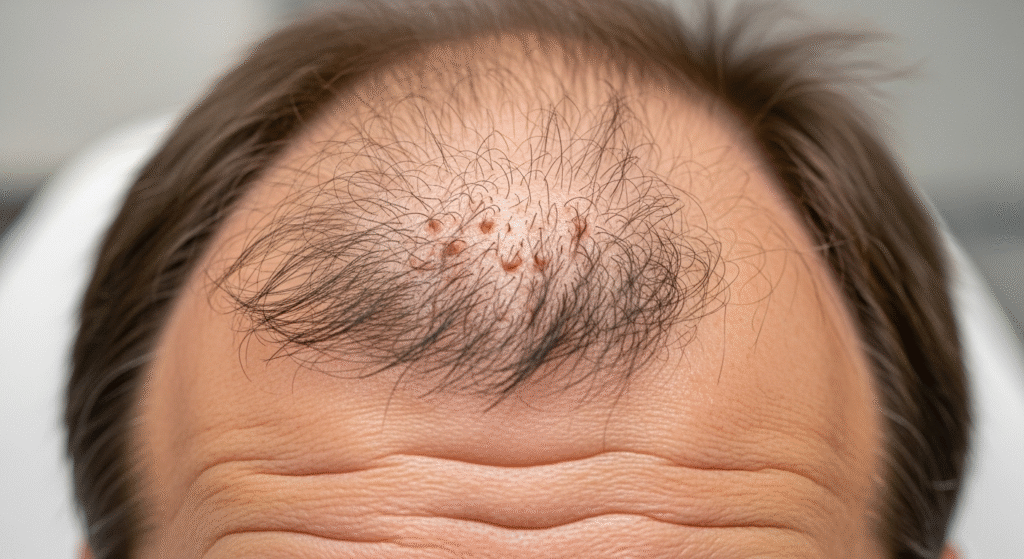
How to Identify Hair Loss Caused by Trenbolone
The symptoms of Tren hair loss are often similar to natural hair thinning, but the process may accelerate faster. Here are the common signs:
- Thinning hair or bald patches
- Receding hairline, especially around the temples
- Excessive shedding, with more hair coming out during showers or brushing
- A noticeable decrease in hair volume and density
Differences Between Tren Hair Loss and Natural Hair Loss
Trenbolone-induced hair loss may occur more rapidly compared to natural hair loss. If you’re taking Tren and notice significant shedding within a few weeks, it’s likely that DHT is contributing to the thinning. Natural hair loss due to aging tends to occur more gradually, and it often affects both men and women, regardless of steroid use.
How to Prevent or Minimize Tren Hair Loss
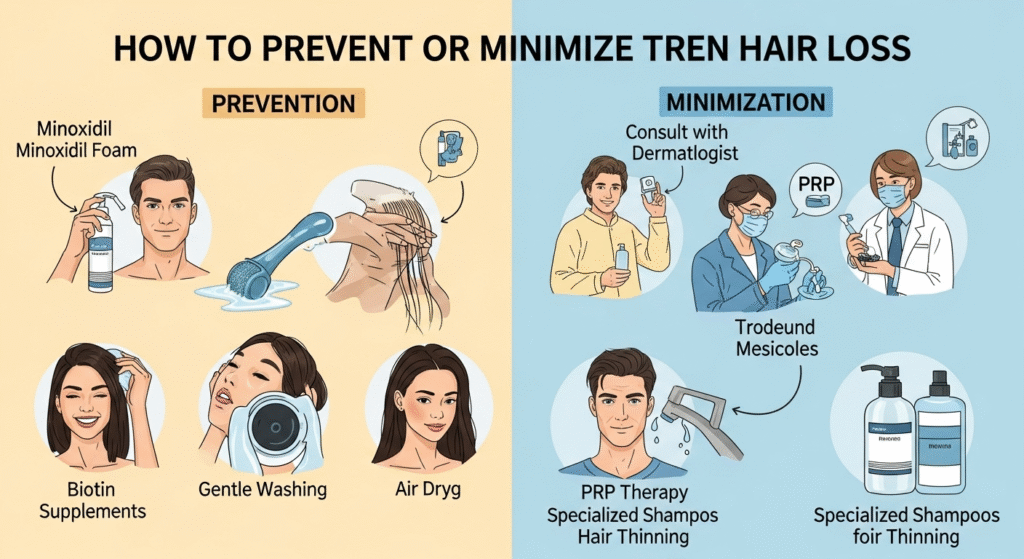
Although Tren hair loss can be severe for some, there are several ways to prevent or minimize its effects.
Use of Hair Growth Supplements and Treatments
There are a variety of treatments available to combat hair loss, many of which can help prevent further thinning:
- Finasteride: This medication inhibits the enzyme 5-alpha reductase, which converts testosterone into DHT. By lowering DHT levels, finasteride can prevent further hair loss.
- Minoxidil: A topical solution that stimulates hair growth and improves blood circulation to the scalp. Minoxidil can help regrow hair that may have been lost due to Trenbolone use.
- Natural remedies: Ingredients like saw palmetto, biotin, and pumpkin seed oil are known to block DHT and support hair growth.
Proper Hair Care and Scalp Health
Maintaining a healthy scalp can make a big difference in reducing hair loss. Here are a few tips:
- Regularly clean your scalp to remove excess oil and DHT buildup.
- Use gentle, sulfate-free shampoos that nourish the hair without stripping it of its natural oils.
- Avoid heat styling and harsh chemical treatments that can damage hair further.
Diet and Lifestyle Adjustments
What you eat can also play a role in hair health. Some nutrients that support hair growth include:
- Vitamins A, C, and E: These vitamins promote healthy hair follicles.
- Zinc: Important for cell division and tissue growth.
- Protein: Hair is primarily made of protein, so a diet high in lean meats, beans, and nuts can help. Additionally, minimizing stress can prevent telogen effluvium, a form of temporary hair loss caused by stress.
How to Prevent or Minimize Tren Hair Loss
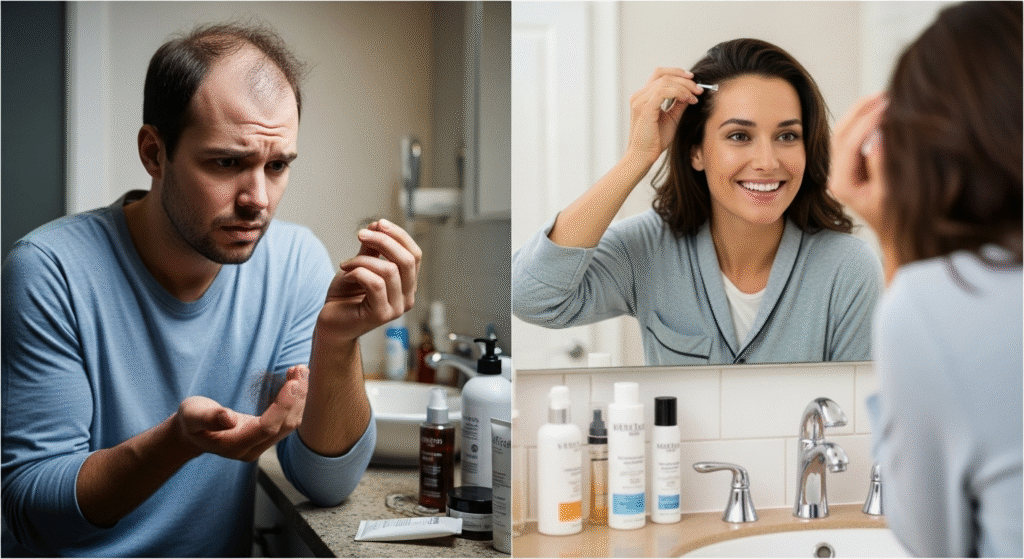
Weighing the Pros and Cons of Trenbolone
Trenbolone is highly effective for building muscle and burning fat, but its side effects—especially hair loss—can be concerning. If you’re seeing significant hair thinning, it may be worth considering whether the benefits of Trenbolone are worth the cost to your hair health.
Alternatives to Trenbolone for Muscle Building
If you’re not willing to risk hair loss, there are safer alternatives that can help you achieve your fitness goals without compromising hair health:
- Natural supplements like creatine and branched-chain amino acids (BCAAs) can help enhance muscle growth without the same side effects as steroids.
- Other anabolic steroids may also have fewer androgenic effects on hair, though they too carry risks.
Expert Opinions on Tren Hair Loss and Hair Care
Real-life cases show that some users who stopped using Trenbolone and began using hair growth treatments like finasteride and minoxidil experienced significant recovery. Recovery timelines vary, but it can take 6 to 12 months for hair to regrow after discontinuing Trenbolone and starting treatment.
FAQs
1. Does Trenbolone always cause hair loss?
No, Trenbolone doesn’t always cause hair loss. Those with a genetic predisposition to androgenic alopecia are more likely to experience hair loss.
2. Can I reverse hair loss from Trenbolone?
Hair loss can be reversed with treatments like finasteride and minoxidil, but recovery may take time.
3. How long does it take for Tren hair loss to show up?
Hair loss can start within a few weeks of using Trenbolone, but it may take longer for some individuals.
4. Are there ways to use Trenbolone without losing hair?
There are strategies to reduce the risk, such as using hair loss treatments and managing DHT levels, but hair loss may still occur.
Conclusion
Worried about Tren Hair Loss?
If you’re experiencing hair thinning or loss due to Trenbolone, don’t panic—there are options to manage and potentially reverse the effects. Start using hair growth treatments, maintain scalp health, and consult with a healthcare provider to find the best solution for your situation.
Book a Consultation with Dr. Uzma Irfan, an ISHRS-certified surgeon in Islamabad Today to learn more about hair loss prevention while using Tren.

